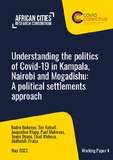| dc.contributor.author | Bukenya, Badru | |
| dc.contributor.author | Kelsall, Tim | |
| dc.contributor.author | Klopp, Jacqueline | |
| dc.contributor.author | Mukwaya, Paul | |
| dc.contributor.author | Oyana, Tonny | |
| dc.contributor.author | Wekesa, Eliud | |
| dc.contributor.author | Ziraba, Abdhalah | |
| dc.coverage.spatial | Kampala | en |
| dc.coverage.spatial | Nairobi | en |
| dc.coverage.spatial | Mogadishu | en |
| dc.date.accessioned | 2022-06-30T10:28:23Z | |
| dc.date.available | 2022-06-30T10:28:23Z | |
| dc.date.issued | 2022-05 | |
| dc.identifier.citation | Bukenya, B., Kelsall, T., Klopp, J., Mukwaya, P. Et al (2022) 'Understanding the Politics of Covid-19 in Kampala, Nairobi and Mogadishu: A Political Settlements Approach' ACRC Working Paper 2022-04, Manchester: African Cities Research Consortium, The University of Manchester | en |
| dc.identifier.uri | https://opendocs.ids.ac.uk/opendocs/handle/20.500.12413/17510 | |
| dc.description.abstract | All three of our cities are located in Eastern Africa, Nairobi being the largest of the
three, with an estimated population of 4.34 million in 2019. Kampala has an estimated
1.75 million inhabitants, while estimates for the population of Mogadishu range from 1.7
to 2.9 million. Each of the cities houses a disproportionate share of the country’s formal
sector businesses and employers, although in each the informal economy is also very
large, much of the population lives in informal settlements, and public infrastructure and
government services leave much to be desired (Earle 2021; Ernstson and Mukwaya
2021; Sverdlik 2021). Problems are most acute in Mogadishu, where, challenged by a
virulent extremist insurgency, there is a large population of internally displaced persons
(IDPs), the government is extremely fragile, and would likely not survive without the
presence of an international peacekeeping force. Politically, each city is also the official
seat of the national government. Sub-nationally, Nairobi is governed by an elected City
County, though some of its functions have recently been transferred to the non-elected
Nairobi Metropolitan Services. Kampala is governed by the Kampala Capital City
Authority, a non-elected body, while Mogadishu is governed by the Benadir Regional
Administration whose leader is also the Mayor of Mogadishu, appointed by the
President (Earle 2021; Ernstson and Mukwaya 2021; Sverdlik 2021).
All three of our cities experienced their first confirmed cases of Covid-19 in March
2020, carried by travellers returning home via international airports. In the cases of
Nairobi and Mogadishu, this triggered a policy response that was already weeks or
months in the making. In Kampala, by contrast, the authorities had already introduced
a number of restrictions on travel and social mixing (ACRC 2022; Bukenya et al. 2022;
Klopp et al. 2022). | en |
| dc.language.iso | en | en |
| dc.publisher | African Cities Research Consortium | en |
| dc.relation.ispartofseries | ACRC Working Paper;2022-04 | |
| dc.rights.uri | https://www.nationalarchives.gov.uk/doc/open-government-licence/version/3/ | en |
| dc.subject | Health | en |
| dc.subject | Politics and Power | en |
| dc.title | Understanding the Politics of Covid-19 in Kampala, Nairobi and Mogadishu: A Political Settlements Approach | en |
| dc.type | Other | en |
| dc.rights.holder | University of Manchester | en |
| rioxxterms.funder | Department for International Development, UK Government | en |
| rioxxterms.identifier.project | Covid Collective | en |
| rioxxterms.version | VoR | en |
| rioxxterms.funder.project | 77b8f9cf-5d96-4012-a396-c9b3f6712d70 | en |

